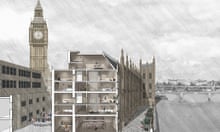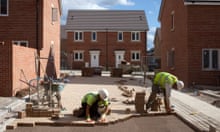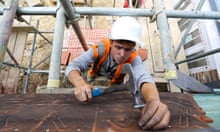Housing experts have accused David Cameron of offering cheap new homes for middle-income earners at the expense of those on low pay after the unveiling of his manifesto on housing.
Outlining his promises in the fast-growing town of Colchester, Essex, the prime minister pledged to solve Britain’s housing shortage at the same time as protecting the green belt. He even claimed the Conservatives would be building 200,000 homes a year by 2017 – three years sooner than Labour.
Central to his offering was a pledge to double the number of discounted starter homes for first-time buyers – a message designed to appeal to younger swing voters. Cameron said developers would be able to afford to build 200,000 of these if they were exempted from requirements to build affordable housing and local infrastructure.
However, he immediately faced criticism from Labour and some housing groups for only vaguely spelling out how his targets would be achieved and paid for.
The charity Shelter accused Cameron of trying to solve an affordability crisis by getting rid of affordable housing.
It said: “The 200,000 homes over the course of a parliament sounds good on the surface, but in reality this is giving with one hand and taking with the other.
“Removing the requirement on developers to build affordable housing is extremely worrying, and won’t help those currently struggling with sky-high housing costs.”
Gavin Smart, interim chief executive at the Chartered Institute of Housing, said the Tory plan “smacks of building for one group of people at the expense of another.
“We are very concerned about these sites being exempt from section 106 agreements, which usually require social or affordable homes to be built as part of a development, for people on lower incomes ... Social housing is critical if we are going to solve the housing crisis – there are always going to be people who can’t afford to buy and we must provide decent, affordable homes for them too. If all the focus is on home ownership, we are never going to build mixed communities.”
Labour said Cameron’s housebuilding plans had been rushed out in a panic before the general election.
Speaking in Hove, the Labour leader, Ed Miliband, drew attention to his party’s plans to increase the number of new homes built every year to 200,000 by 2020, saying housing would be “the biggest priority for the next Labour government”.
Miliband said that both Labour and Conservative governments had failed to do enough to tackle the housing crisis, but that the coalition had presided over a fall in housebuilding to the lowest level in peacetime since the 1920s.
Labour has pledged to give local first-time buyers priority access rights when newly built houses go on sale. The party also plans to legislate to give renters three-year tenancies, to cap rent rises during that period and to abolish fees imposed on tenants by letting agents.
Miliband said: “Yesterday the Conservative party chairman [Grant Shapps] went on TV in an effort to convince people they had a plan for housing. But instead, he couldn’t answer basic questions about where the money will come from or how their latest pie-in-the-sky scheme will work.”
Labour said Shapps’s claim that the coalition had delivered 220,000 homes for social rent did not hold up against the government’s own figures, which show that 105,090 have been built since 2010 – many of which they say were the result of commitments made by the last Labour government.
Cameron’s starter homes would be sold at a discount of 20% and the purchasers would not be allowed to sell them at full market value for at least five years, although they may be entitled to rent them out. They would largely be built on brownfield sites, previously used for industrial or commercial purposes and not already earmarked for housing.
On Monday, the Tories said 31,000 people had applied to benefit from the scheme over the weekend.
Housing professionals have challenged the first version of the scheme, describing it as “Ryanair housing” that will reduce still further the already depleted number of social homes in England.
The Conservative plans states that housebuilders can afford to sell the homes at 20% below the market price because they will be exempt from the community infrastructure levy, used to pay for services such as roads and sewers, and from section 106 obligations, which require social housing to be included in building schemes or for a payment to be made in lieu. They will also be exempt from the zero carbon standard, designed to ensure they emit no carbon. The homes will only be available to households aged under 40, the age group least able to afford to buy their own homes.
Shapps, a former housing minister, was unable or unwilling to explain in greater detail how housebuilders could afford to offer homes at 20% below market prices or how the shortfall could be financed, when he appeared on Sky News’ Murnaghan programme on Sunday.
The government is proposing to set up a Design Council to encourage and promote good design in starter homes, but it will have no powers to enforce the highest standards.
Labour has warned that the planned homes may be stuck on the edge of town, away from bus services and schools, and tagged on to business parks or industrial estates.
A 20% discount will save the average first-time buyer £43,000 on a £218,000 home (the average cost paid by such buyers), which would leave a revenue shortfall of £8bn from income if current regulatory obligations had been retained on the 200,000 homes.
Scepticism about the sincerity of coalition parties to commit seriously to a housebuilding programme has been expressed by the outgoing Liberal Democrat MP Jeremy Browne.
Speaking at the Policy Exchange thinktank last week, he said: “Both governing parties travelled on the train from Waterloo down to the Eastleigh byelection in 2012 and argued to the local electorate that they would be the ones that were most effective at stopping any new housebuilding taking place in Eastleigh, and then got on the train and came back to Waterloo and made speeches here in Westminster about why we need more housebuilding.
“I said to Nick Boles, who at the time was the planning minister, ‘Have you been down to Eastleigh yet?’ and he said, ‘I’m told I’m not allowed to go down in case it inflames the whole housebuilding issue.’”
Browne added: “The public, whether it’s the NHS or housebuilding, detect that gap, and you will see it now at constituency level with quite debased leaflet-based campaigning about what the parties are going to stop at local level, which is almost completely at odds with the macro-level speeches that the leaders are making up in Westminster.”







